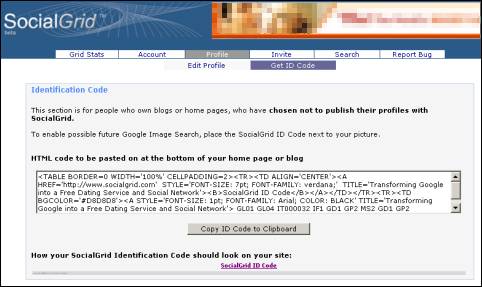Wednesday, May 5, 2004
Turkish Google Blog
This Turkish Google Blog has been brought to my attention. If you speak Turkish, enjoy!
SocialGrid

Now this is an interesting and pragmatic use of metadata in the age of Google. SocialGrid lets you find friends or partner by putting up specific metadata on your website. There are only 6,203 users so far, we know Google does take its time to index the Web (and whatever data you upload to your site), and the Google Web API won't allow for unlimited access, but otherwise the service and its approach poses not much limitations. After all, data is stored on Google servers. However as soon as you put up a public file, your can't shield anyone (even people outside this service) to google you. SocialGrid is not for those concerned with privacy.
If you decide to tag your website with a "SocialGrid Identification Code" however, be wary. The suggested SocialGrid ID will be in a font so small only a machine could read it (i.e. Google) but no normal visitors to your website. And this just happens to be the way many spammers try to search-engine-optimize their pages. Naturally, Google tries to prevent such behavior, and you may end up getting axed. Now I changed the HTML and made it clearly readable (Google won't expose the difference because you cannot query for HTML details). And here you go:
SocialGrid ID Code GL01 GL04 IT000032 IF1 GD1 GP2 MS2 GD1 GP2 MS2
One thing though, above data (which means I'm male, in a relation-ship, look for business partners, and so on) is public data – everyone can hack the code and write up a Google Web API application which starts hunting the Web for these pieces. E.g. I temporarily changed my gender settings to female to find out the last parameter value "GD1" means "gender: male":
Before: GL01 GL04 IT000032 IF1 GD1 GP2 MS2 GD1 GP2 MS2 After: GL01 GL04 IT000032 IF1 GD2 GP2 MS2 GD2 GP2 MS2
Now I also suppose "GP2" means "Gender preference female", in other words querying Google for "socialgrid id code" "GD2 GP1" find all women who prefer men – and there you go, a demo profile at SocialGrid pop up (I suppose there's just not enough data indexed yet to make this work). In any case, SocialGrid is already being evil by aiming to sue the pants off of those trying to use their metadata (see their warning to copycats and clones) – not a good start. Indeed, as Techdirt commentary points out, what the world needs is a working open standard, as opposed to a shady business scheme.
Also see: Plink searches Friend-of-a-Friend files.
Get Your Gmail By Being Fast
Gmail now has a new option for users to invite 2 new friends into the program. I will hereby hand out a free Gmail account with 1 GB storage to the first two people who send an email with the subject “Gmail-Invitation” to blog@outer-court.com. (Please provide your full name.)
Thanks for all those mails – we got two lucky winners, Petja and Thomas!
(No need to write anymore and sorry if your email was too late.)
Googlerace
At Googlerace.com, you can let Google decide on the election trend for the next President using specific keywords. The site uses the Googleshare algorithm to rank candidates*.
Via French Google blog Maxhoo, which also shows off a bunch of national Google celebration logos of the past few days. Plus, Eric Lebeau put up a new page on Googleguy’s sayings.
* However I am not sure if it takes the relative Googleshare or the absolute one – I find the relative approach to be more effective. Take Centuryshare, which weighs a word according to the Googleshare across different years. As “1900”, “1910” etc. have natural peaks (a higher quantity of pages mentioning those numbers), they naturally also have higher absolute Googleshares for any word. So if you take the Googleshare percentage it works, it does not work well if you compare absolute numbers.
SuperGoogle

Image © Salon.com. Used with permission.
“I call it SuperGoogle. It’s a search engine that knows everything. In fact, it’s less search engine and more oracle. You and I don’t have access to it (yet). If we did, we would turn to it to learn everything about everything and everybody. No information, public or private, is concealed from SuperGoogle. It knows what we write in our e-mail and what we say on the phone. It surely knows everything we buy and everywhere we travel. It knows our medical histories; maybe it’s even seen our DNA. SuperGoogle knows our faces. It can recognize us on a street camera when we stroll on by.”
– Hans-Peter Brøndmo, SuperGoogle: When All Is Known, May 3, 2004 [Via Battelle.]
>> More posts
Advertisement
This site unofficially covers Google™ and more with some rights reserved. Join our forum!
